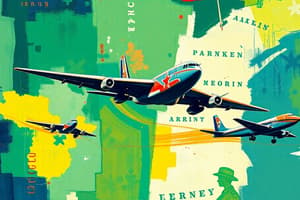Podcast
Questions and Answers
What event led to the Korean War?
What event led to the Korean War?
- The end of the Second World War
- The rise of communism in Eastern Europe
- The Chinese Civil War (correct)
- The Soviet Union's blockade of Berlin
What was the final resolution of the Korean War?
What was the final resolution of the Korean War?
- The surrender of North Korean forces
- The division of Korea at the 38th parallel (correct)
- The establishment of a unified Korean government
- The signing of a peace treaty
What is the term for making your military so strong that nobody would dare attack you?
What is the term for making your military so strong that nobody would dare attack you?
- Defense strategy
- Deterrent (correct)
- Military buildup
- National security
What event terrified Americans of the fear of a nuclear attack?
What event terrified Americans of the fear of a nuclear attack?
What was the main goal of the Silent Generation?
What was the main goal of the Silent Generation?
What was the main goal of Truman's Fair Deal?
What was the main goal of Truman's Fair Deal?
What was the main goal of the Taft-Hartley Act?
What was the main goal of the Taft-Hartley Act?
What was the main goal of the March on Washington?
What was the main goal of the March on Washington?
What was the outcome of the Cuban Missile Crisis?
What was the outcome of the Cuban Missile Crisis?
What was the main goal of the Immigration Act of 1965?
What was the main goal of the Immigration Act of 1965?
Flashcards are hidden until you start studying
Study Notes
Causes of the Korean War
- The Chinese Civil War led to the Korean War
Korean War
- MacArthur wanted to open a second front in China to break the stalemate
- The 38th parallel was the final resolution of the Korean War
Cold War and Nuclear Power
- Deterrent: making your military so strong that nobody would dare attack you
- The first atomic bomb testing in facilities terrified Americans of the fear of a nuclear attack
- The 1950s saw the first practical use of nuclear power with the building of the American Silver nuclear power plant
Culture and Society in the 1950s
- The Silent Generation chose entertainment and fun
- Women in the 1950s were expected to manage the household
- Jack Kerouac was a famous writer seen as a spiritual leader
- Hippies resented the conformity of the 1950s
Politics and Labor
- Truman's Fair Deal aimed to extend the New Deal
- 1946: Railroad Strike, Truman tried to replace striking workers with scabs
- State preferred performance over seniority
- Taft-Hartley Act (1947) restricted labor strikes that threatened national interest
- Baby boom led to people moving from cities to suburbs, buying second cars, and family growth
Civil Rights Movement
- Brown vs. the Board of Education (1954) ended "separate but equal" and led to the Little Rock Nine
- Montgomery Bus Boycott introduced leaders like Martin Luther King
- Martin Luther King was all about non-violent protest
- James Meredith tried to attend the University of Mississippi
- The treatment of demonstrators by Birmingham police (using German Shepherds and fire hoses) angered Americans
- March on Washington featured Martin Luther's "I Have a Dream" speech
- Freedom Summer and the March were both for freedom rights
Civil Rights Leaders
- Malcolm X believed in racial separation
- NAACP challenged segregation laws
- SCLC (Southern Christian Leadership Conference) was a group of African American clergy
- SNCC started to become more militant under Stokely Carmichael's leadership
- Black Panthers wanted African Americans to lead their own communities
Assassinations and World Events
- Robert Kennedy assassinated on June 4, 1968, two months after Martin Luther's assassination
- Berlin Wall was built to keep East Germans from fleeing to the West
- Kennedy's obstacles included his age and health
- New Frontier was his domestic platform for addressing poverty and included the state's program
Kennedy's Administration
- Kennedy proposed to end the recession by raising taxes
- Missionaries commission said Kennedy's assassination was a one-man act
- Peace Corps aimed to raise the standard of living
- Alliance of Progress helped discourage the spread of communism
Johnson's Administration
- Great Society included Medicare and public education
- Cuban Missile Crisis: Soviets removed missiles from Cuba
- Baker vs. Carter: one man, one vote
- Immigration Act of 1965 aimed to extend the flow of refugees
Vietnam War
- Ho Chi Minh was the national leader in Vietnam against the French
- South Vietnamese leaders overthrew Ho Chi Minh because Americans allowed it
- Fighting conditions in Vietnam for American soldiers included booby traps
- US used saturation bombing in Vietnam, carrying as many bombs as their planes could hold
- An advantage for the Viet Cong was their elaborate tunnel system
- Gulf of Tonkin gave Johnson control of military action
- Domino Theory: reason we went to South Asia in fear of countries falling like dominoes
Events and Protests
- Agent Orange burned all trees to see Viet Cong
- Milan Massacre: Cali was the leader
- Most people who refused to be drafted were conscientious objectors
- Nixon continued bombing raids
- Ho Chi Minh trail
- Leader of the American Army in Vietnam: William
- Penn State massacre: four shot killed
- Neil Armstrong and Buzz Aldrin were the first men to walk on the moon
Studying That Suits You
Use AI to generate personalized quizzes and flashcards to suit your learning preferences.




